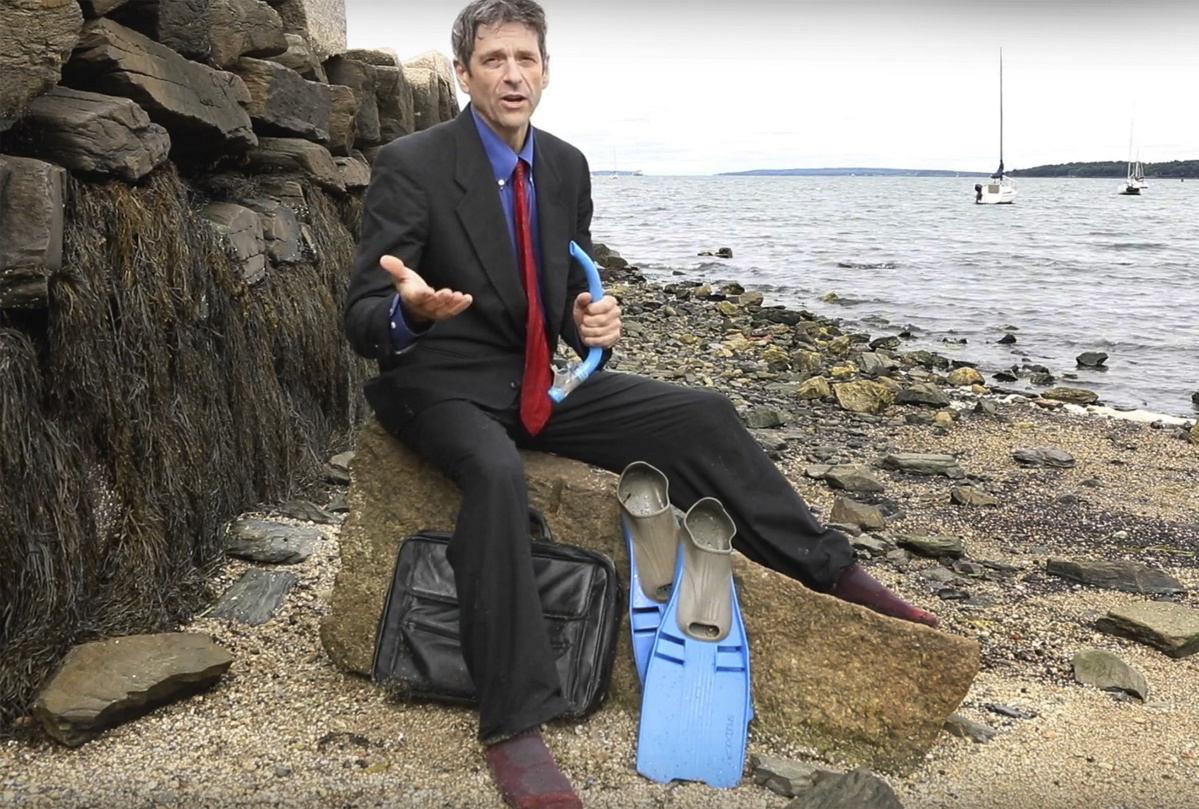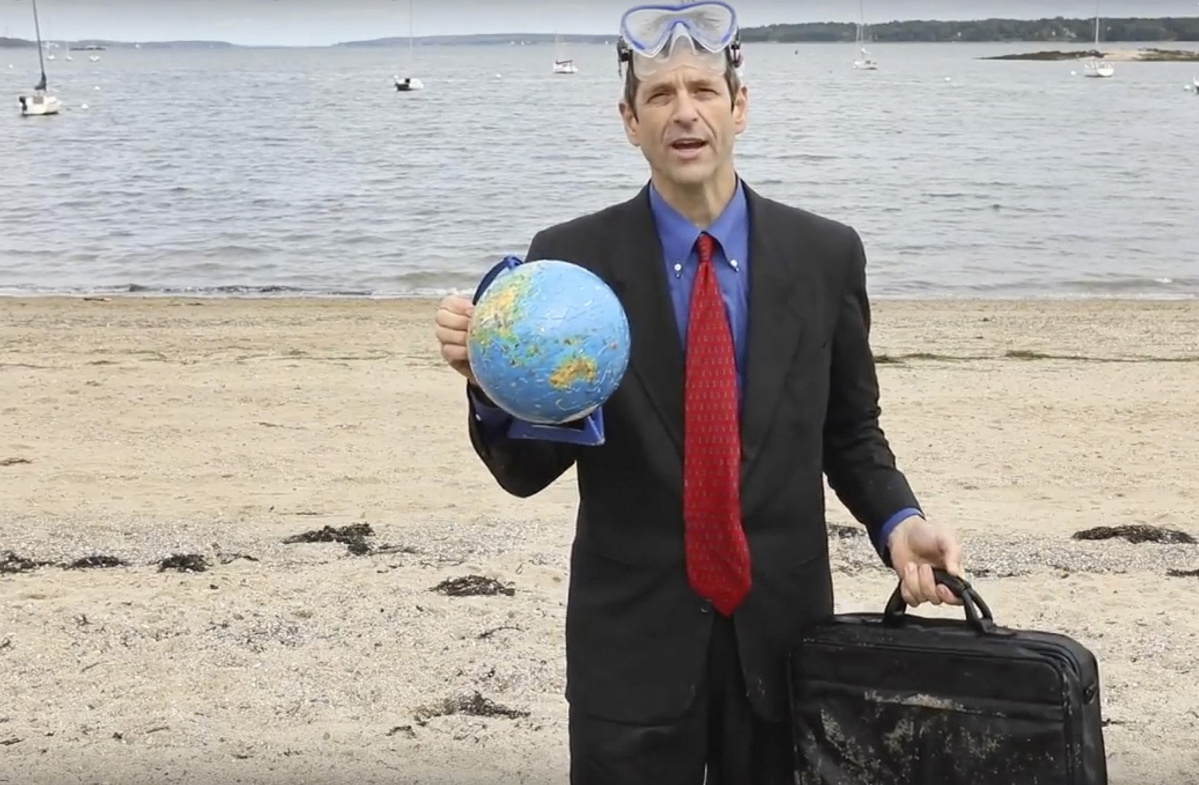On the list of things that aren’t funny, climate change has to be the top. Not even a plague punchline can compete with a worldwide catastrophe of our own making for least funny.
Nonetheless, Jason Wentworth is working on a climate change comedy routine. The Portland resident is not revolutionary in this; late night comedians have, prompted by two major rglobeports warning of dire consequences for humanity, been poking fun at climate change deniers and what Wentworth calls “the great corporate villains.”
That’s not what Wentworth wants to do though. He’s aiming for comedy that empowers and inspires the individual to contribute to the solutions. “People in their daily lives have tremendous opportunities to make changes,” he said. He wants to kindly – but hilariously – convince them of that.
The Wentworth brand of comedy is, or will be (he’s still working on his routine) interwoven with climate change activism, to focus on reaching what he calls “the believers who are in denial.” Like he was. He plans on being the brunt of many of his own jokes. “I pull in that experience of being someone who totally believed what I was doing was going to help save the world.”
For years Wentworth considered himself a “kind of champion of environmental stewardship.” He’d served in the state Legislature, worked for an alternative energy company, been an environmental coordinator at Bates College and then, with his wife, owned and operated first the Washboard Eco-Laundry in Portland and then Portland’s Greener Cleaner in East Bayside.
And then it came crashing down on him as he began to question the true worth of his so-called-green-life.
THE WEARING OF THE GREEN
When Portland’s Greener Cleaner opened in East Bayside in 2012, it was a state of the art sustainable business, serving people who wanted their clothes to look dry cleaned, but without the chemicals. The dry cleaning process uses a petroleum-based solvent called perchloroethylene, or perc, which the Environmental Protection Agency classifies as a “possible to probable” human carcinogen. On Fox Street, Wentworth and his wife, Sandrine Chabert, were running a wet-cleaning plant, which cut out the perc and cut back on the energy use.
Then in July of 2016, after briefly trying to sell the business, they shuttered it. Wentworth had had a crisis of confidence in what he was doing.
“I really felt like I was just enabling people to feel less guilty about their massive consumption,” he said. “And I wasn’t really having any bigger impact on the textile industry. By the time people make it to me, they had already done all the consumption.”
There were other factors. Physically running the cleaning plant was hard. Getting away for vacation meant basically shutting down the business because he and Chabert were the only ones who knew the process. No one wants to wait three weeks for their suits to get clean while their cleaners are lying on a beach somewhere.
But the big problem was he couldn’t stop thinking about how much energy and detergents it still took to wet-clean clothing. The packing, the shipping, the whole process involved with the business. Why not wear jeans and a shirt that can go into the laundry at home?
“It was painful for me to realize where we are and where we need to get to,” he said. “To the point where going to work doesn’t require wearing a different kind of garment made by very poor people in a sweatshop somewhere in Indonesia (or another Asian country).”
The system felt broken and wrong, even the green version.
“I don’t think the planet can sustain it anymore,” Wentworth added. “I felt like I was deceiving myself.”

He still believes that wet-cleaning is better for the environment, and that greening all our consumption is a necessary approach. But being in dry cleaning business?
“It just doesn’t work for me anymore,” he said.
He wants to be transparent about the fact that if the couple had found a buyer, they would have sold. But as their self-imposed deadline to find one passed, they decided to walk away.
“Closing it in a weird, twisted way was a better long-term approach,” he said.
Many customers disagreed, he said. “I think it was very hard for them to hear somebody make the argument that the green alternative was not as green as they might think.”
HOW HOT IS IT?
Climate change comedy isn’t exactly trendy, but it’s not unheard of. A British actor and comedian, Marcus Brigstocke, was working global warming jokes into his standup more than a decade ago. Five years ago, a headline on the Onion read “Scientists Recommend Having Earth Put Down.”
Back when he hosted The Tonight Show, Jay Leno occasionally wisecracked about climate change. Like the one about how if the warming trend continues, by 2015 “Hillary Clinton might actually thaw out.” When Leno appeared on Jimmy Fallon’s version of The Tonight Show in 2016, he did a whole “how hot is it” schtick that included the punchline, “Bill Cosby is slipping his dates chill pills.” Then Leno launched into this joke:
“Scientists from John Hopkins University say that global warming may cause an increase in cases of diarrhea worldwide. You know what the means? It means global warming has gone from our Number One problem to our Number Two problem.”
You can even find some climate change jokes on that classically staid publication Reader Digest’s website, like the one about new names already being chosen for cities if the polar ice caps melt. Like: “Atlantis City, New Jersey.” Bah dah bum.
In the last couple of months, climate change comedy has kicked into higher gear, in large part due to two recent reports. In early October, the United Nation’s Intergovernmental Panel on Climate Change released a report full of dire warnings about major economic and humanitarian impacts from climate change impacting the world by 2040. Then, despite doubts from the president about climate change, the Trump Administration released a government report from scientists reinforcing the IPCC report. Trevor Noah blasted climate change deniers on The Daily Show, which features an occasional sketch from correspondent Ronny Chieng called “How will climate change affect me personally.”
On the heels of the IPCC report, Saturday Night Live featured skits about climate change in October, including a Weekend Update bit that dealt with how overwhelming it is. “We’re already in too deep,” said Weekend Update co-host Colin Jost. “It’s like if you owe your bookie $1,000 you’re like, I got to pay this dude back. But if you owe your bookie one million dollars you’re like, I guess I’m going to die.”

This daunting aspect of climate change is a key element of what Wentworth wants to address in his comedy. When scientists say the best way of addressing climate change is for countries to become carbon neutral within 30 years, Wentworth thinks people tend to shut down. It’s the ultimate test of human beings’ potential for procrastination.
“If I said to you, over the next 30 years, I think you should try to lose 30 pounds, you would not take a single step toward that,” he said. But if the focus was on losing 2 pounds in the next year, or cutting carbon emissions by X, Y or Z in the next year, that might get some traction. Small goals in search of a big impact, in other words. “People could take their mileage amount that they insert in their IRS tax returns and say, ‘Can I cut 5 percent off that?’ And the next year, you can cut another 5 percent.”
“I want to test the theory that comedy can be an avenue to get people to think about their own role in it,” Wentworth said.
POST GREEN WASHING
These days Wentworth wears jeans and resists consumption, mightily. He went back to being a carpenter, relying on skills he was exposed to since childhood (his father was building passive solar homes in the early ’70s). He electrified a tandem bike so he could take his daughter to school. To get to his carpentry jobs, he uses public transit and/or rides his bike. “I’m one of the few carpenters who does that who doesn’t have an OUI,” he says.
If you are wondering if that is a line from the show he’s developing, it is. He regularly drops material into conversation, trying out bits.
The idea to do comedy came to him after he’d gone back to carpentry. He was looking through an adult education catalog and saw a listing for a stand-up comedy class. In his new life he was already seeing comic possibilities, like how many electric outlets the large passive solar house he was working on had. Did a retired couple building a house to help save the world really need a hundred outlets to light their way?
During the class he decided he didn’t want to work up a classic stand-up routine, filled with the kind of zippy material that wins over an audience in three minutes.
“For me, the intersection of comedy and climate change is not so much the stand-up routine in front of inebriated customers in a club,” Wentworth said.
He’s preparing for a first gig at a Quaker Friends meeting in Damariscotta sometime late this winter. He wants to speak to rotary clubs and churches and on college campuses, “to talk to smaller audiences where there can be a more personal connection,” he said. “And hopefully some discussion.”

And not a conversation limited to those corporate villains he referenced before. While he appreciates the impulse to restructure capitalism and wants to hold oil companies accountable, he says, he doesn’t place high odds on winning that battle. “If that is all we are doing, we are going to blow all our chances.”
We should grab the chances we have individually while we can, he said, including taking steps like transitioning to buying a majority of your food from local sources. “But if at the same time everyone in your family is buying new iPhones every time they come out, that is the antithesis of sustainability.”
“I think about things like how many of my friends have moved to new neighborhoods because they wanted a new school district,” he added. “But I have so few friends who have moved to a location that would allow them to walk to work.”
He gets it. Being raised in a consumer culture makes it very hard to step away. Like how seriously tempted he was to trade in the family Prius for a fully electric Chevy Bolt.
“That’s when I started to back up and think about my denial issue and how it related to this car,” Wentworth said, “I wasn’t even intrigued by the idea of no car and how I could do that.”
So many people say, “I would ride public transit more, but it is so inconvenient,” he said. “My response is, ‘Have you tried it?’ I want to talk about how inconvenient it is to row Grandma in a canoe to a Red Cross center after a hurricane and then return to your house to rip out wet sheetrock. Or if you live in Paradise, California, it is super inconvenient.”
That’s a joke by the way, even if it feels like no joke at all.
Mary Pols can be contacted at 791-6456 or at:
Twitter: MaryPols

Comments are no longer available on this story